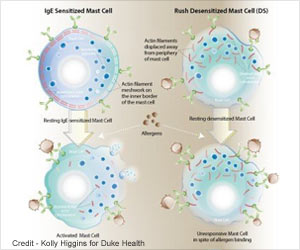
‘Newer therapies for managing allergies can be developed by understanding the cellular events that occur during desensitization.’
Tweet it Now
Soman Abraham Ph.D, Professor at the Duke University School of Medicine and Duke-National University Singapore Medical School and senior author of the study said that “We have known for at least 100 years that the approach is effective”“People who have terrible, even life-threatening reactions to certain antigens can then tolerate an exposure – if just for a short period of time.” he added.
Abraham’s team along with A. Wesley Burks M.D , carried out different experiments to understand cellular processes that occur during allergy reactions and rush desensitization. Burks was known to be the first person to develop peanut allergy approach on children which was based on rush desensitization principle.
They were able to describe the disruption that occur inside the mast cells among actin filaments that form the inner coat of the cell. When an allergen approaches these tiny filaments, they move to the center of the cell and break down resulting in the eruption of granules.
Sometimes when the actin moves prematurely to the center of the cell due to tiny dose of allergens, they do not initiate eruption and release of granules. This thus avoids allergic reactions.
Advertisement
This study carried out along with Alison M. Church, Mike Kulis and Hae Woong Choi was published in the Journal of Clinical Investigation.
Advertisement
Source-Medindia













